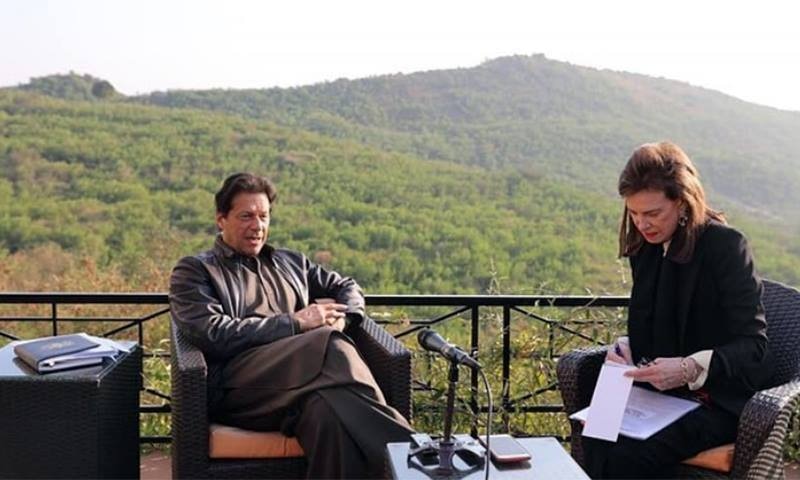'Do not want Pakistan treated like a hired gun': PM Khan on US ties

Prime Minister Imran Khan, in an interview with The Washington Post, expressed his desire to have "a proper relationship with the US" akin to Islamabad's ties with China rather than the one "where Pakistan is treated like a hired gun".
The prime minister, in an exclusive interview with the American newspaper on Thursday, said: "I would never want to have a relationship where Pakistan is treated like a hired gun — given money to fight someone else’s war. It not only cost us human lives, devastation of our tribal areas, but it also cost us our dignity."
When asked to elaborate on the ideal nature of relationship that he would like to have with Washington, PM Khan added: "For instance, our relationship with China is not one-dimensional. It’s a trade relationship between two countries. We want a similar relationship with the US."
The prime minister rejected the notion that he is "anti-US", saying that disagreeing with Washington's policies did not make him "anti-American".
"This is a very imperialistic approach: 'You’re either with me or against me'," he said.
When asked if he wanted relations between Pakistan and the US to "warm up", the prime minister responded: "Who would not want to be friends with a superpower?"
The premier, however, stuck to his anti-drone attacks stance and wondered why anyone would support it. "Who would allow a drone attack in their country when, with one attack, you kill one terrorist and 10 friends and neighbours?" he questioned. "Has there ever been a case of a country being bombed by its own ally? Of course I objected to it. All it did was create more anti-Americanism."
'Humiliating US did not trust Pakistan over OBL operation'
The prime minister also condemned the 2011 US operation in Abbottabad that killed Osama bin Laden, saying that it was "humiliating" that the US did not trust Pakistan to kill the terrorist.
"It was humiliating that we were losing our soldiers and civilians and [suffering terrorist] bomb attacks because we were participating in the US war, and then our ally did not trust us to kill bin Laden," he regretted and added that the US "should have tipped off Pakistan".
When asked if he, at one time, had condemned bin Laden's killing itself and called it a "cold-blooded murder", the premier said he "didn't know where this came from".
"Cold-blooded murder!" he repeated in exasperation.
The prime minister also dismissed US' allegations that there were safe havens for terrorists in Pakistan, saying that the security forces had briefed him on the matter and told him that they had asked Washington "time and time again" to point out where the sanctuaries are.
However, he did not discount the possibility of some Afghan Taliban, "maybe 2,000 to 3,000" crossing the border under the guise of refugees and residing in camps.
The prime minister also discussed his recent spat with US President Donald Trump, clarifying that it was not a "Twitter war, it was just setting the record right".
He insisted that peace in Afghanistan was in Pakistan's interests, and assured that Islamabad would "try [its] best to put pressure on the [Afghan] Taliban" in order to bring them to the table and hold negotiations.
"Putting pressure on the [Afghan] Taliban is easier said than done," he warned. "Bear in mind that about 40 per cent of Afghanistan is now out of the government’s hands."
Take a look: US-Taliban talks
The premier reminded the interviewer of his long-held stance that the Afghan conflict did not have a military solution, adding that he was termed "Taliban Khan" for it. "Now I’m happy that everyone realises there is only a political solution. From Pakistan’s point of view, we do not want the Americans to leave Afghanistan in a hurry like they did in 1989."
Prime Minister Khan dismissed the accusation that past Pakistani governments had "lied" to the US, adding that the American administration had been "misinformed".
"Is it possible that the greatest military machine in the history of mankind — 150,000 Nato troops with the best equipment and over $1 trillion — are they saying that just a few thousand Pakistani insurgents are the reason they didn’t win in Afghanistan?" he asked. "The United States expected Pakistan to take on the Afghan Taliban. But the Afghan Taliban were not hitting Pakistan. Tehreek-i-Taliban and Al Qaeda were hitting us."
Hopes for Pak-India talks
Prime Minister Khan also regretted that his government's repeated overtures for peaceful negotiations with New Delhi had been turned down.
Unfortunate that Indian media tried to politicise Kartarpur border opening: PM Khan
"The ruling party [in India] has an anti-Muslim, anti-Pakistan approach," he pointed out. "Let’s hope that after the election is over, we can again resume talks with India."
He maintained that he wanted the case of the Mumbai attacks to be resolved, adding that he has "asked our government to find out the status of the case".
'Straight forward'
When asked about the recent arrests of Tehreek-i-Labbaik Pakistan's (TLP) workers and leaders, including its party chief Khadim Hussain Rizvi, Prime Minister Khan said that the matter was "straight forward".
"I had gone on television and warned everyone that we will stand by the Supreme Court verdict," he recalled. "If you don’t stand by what the Supreme Court says, then there’s no state left. The head of the TLP then passed a death sentence on the Supreme Court judges and kept saying that they should be killed."
The prime minister reiterated his plan to end poverty from the country, with or without the International Monetary Fund's programme.
He said that the country had received monetary help from Saudi Arabia, China and the United Arab Emirates, but said the latter two countries wanted the figures to remain "confidential".














































